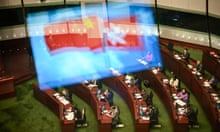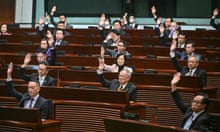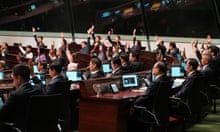Hong Kong’s censors have been given expanded powers to vet films for national security breaches in the latest blow to the Chinese city’s political and artistic freedoms.
In a statement on Friday, authorities said the film censorship ordinance had been expanded to include “any act or activity which may amount to an offence endangering national security”.
“When considering a film as a whole and its effect on the viewers, the censor should have regard to his duties to prevent and suppress acts or activities endangering national security, and the common responsibility of the people of Hong Kong to safeguard the sovereignty, unification and territorial integrity of the People’s Republic of China,” the new guidance, which is effective immediately, states.
Films and cultural activities are often rigorously vetted on the Chinese mainland; only a handful of western films or documentaries ever see a commercial release each year. Hong Kong’s Film Censorship Authority, in comparison, has traditionally employed a much lighter touch and the city has long been a centre for Asian films.
“[The latest move] is a highly worrying development that will certainly have an impact on the city’s film industry and cultural climate,” said Anne Sytske Keijser, a lecturer at Leiden University Institute for Area Studies who researches Chinese-language cinema.
Keijser said the latest move will probably lead to more creators self-censoring, and investors being deterred from developing and funding independent films and documentaries that might run foul of the new rules.
“I also worry what will happen to films and documentaries that have already been made about the protests over the past years. Will they simply no longer be screened or will their makers be targeted as well?” she said.
The authorities said the amendments “seek to provide censors with clearer guidelines on film examination and classification” following the implementation last year of a wide-ranging national security law.
The controversial legislation and an official campaign dubbed “patriots rule Hong Kong” have since tamed much dissent and effectively strangled the former British colony’s pro-democracy movement.
The trickle-down effect in the artistic sector is also evident, observers say. Earlier this year a university in the city cancelled a prestigious press photography exhibition that featured pictures of the huge protests in 2019, citing security concerns.
Right on cue: a film with storyline related to 2019 protests (although from the trailer looks totally innocuous) fails to get censors’ approval for screening. Will HK indie filmmakers become like their mainland counterparts, denied a home audience & only able to screen abroad? https://t.co/smKx6PP6Fx
— Antony Dapiran (@antd) June 11, 2021
In March, the authorities decided not to exhibit at the opening of a new museum a photo showing the dissident Chinese artist Ai Weiwei holding up his middle finger at Tiananmen Square in Beijing.
M+, a multimillion-dollar contemporary art museum, said it would allow security officials to vet its collection for any potential national security law breaches before it opens to the public later this year.
Also in March, an award-winning documentary about Hong Kong’s massive protests was pulled hours before its first commercial screening after days of criticism from a pro-Beijing newspaper. It said the film’s content breached the new national security law.
Keijser said that the latest move might also spark more creativity in self-expression – contrary to the authorities’ intention.
“The film and arts scene of Hong Kong has proven to be both resilient and creative. People will find different, more oblique ways to voice their dissent,” she said.









